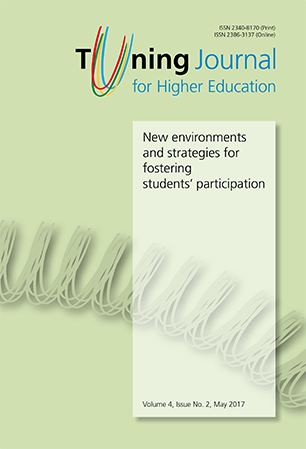Ethical Competencies and the Organizational Competency ‘Responsible University Social Innovation’: looking at new ways of understanding universities and the competency-based education model in the context of significant social changes in Latin America
Abstract
Ethical competencies are included in all competency-based education models and are considered essential for the professional preparation of students, especially in terms of their professional conduct and workplace preparedness. As such, the Tuning Academy, along with incorporating ethical competencies in its group of generic competencies, also considers the organizational competency Responsible University Social Innovation (RUSI) as part of its Tuning ALFA II Latin América project. This competency, in the area of organizational character, addresses innovation in the context of social responsibility, which it assumes each university should have, in terms of ethical responsibility toward the members of a community. This concept incorporates the equal relationship between the university’s internal community and civil society. By means of interviews with experts in the areas of service-learning, social responsibility, and ethical civil and professional education from the University of Deusto and the Zerbikas Foundation, this article discusses the connection and implementation of both generic ethical competencies and the RUSI organizational competency in higher education in order to respond to the new challenges to professional training in today’s world, all of which ultimately assumes a change in universities’ understandings of themselves as institutions and the role of higher education in general.
Published online: 31 May 2017
Downloads
References
Boisier, Guy. “Modelos de gestión universitaria en un contexto de desarrollo regional.” 2010. Accessed April 20, 2016. https://es.scribd.com/doc/309627379/Boisier- Guy-nd-Modelos-de-gestion-universitaria-en-un-contexto-de-desarrollo-regional.
Castells, Manuel. “La edad de la información.” Sociedad y Cultura, no. 3 (2006): 188-191.
ISO. “ISO 26000-Social responsibility.” (2014). Accessed February 5, 2016. https:// www.iso.org/iso-26000-social-responsibility.html.
Deusto Tuning Academy. “Tuning Latin America Project 2004-2008.” (2010). Accessed April 5, 2016. http://tuning.unideusto.org/tuningal.
Moreno, Prudenciano, and Gabriela Soto. “Una mirada reflexiva crítica al enfoque por competencias.” Educar, October - December (2005): 73-79.
Ricoeur, Paul. Si mismo como otro. México: siglo XXI, 2006.
_____.Caminos del reconocimiento: tres ensayos. México: Fondo de Cultura Económica, 2006.
Universidad Católica de Temuco. Competencias genéricas para la formación integral de los profesionales. Temuco: Ediciones Uc Temuco, 2013. Accessed April 25, 2016. http://www.cedid.uct.cl/img/info8/ModeloEducativoUCT%20 (1) _3_20140829222942.pdf.
Unesco. “World Conference on Higher Education 2009. Final Report.” (2010). Accessed April 20, 2016. http://unesdoc.unesco.org/images/0018/001892/189242e.pdf.
Villa, Aurelio, trans. Un modelo de evaluación de la innovación social universitaria responsable. Bilbao: Universidad de Deusto, 2013.
_____.“La innovación social en el ámbito universitario. Una propuesta para su diagnóstico y desarrollo.” RAES, revista argentina de educación superior, no. 8 (2014): 188-218.
Valleys, Francois, Cristina De la Cruz, and Peru Sasía. Responsabilidad social universitaria. Manual de primeros pasos. Mexico: Mcgraw-Hill editores, 2009.
Zamagni, Stefano. “Ethical Challenges in university teaching and research of the economy.” Paper presented at a seminar at the Centre for Applied Ethics of the University of Deusto, Bilbao (Spain), February 4, 2016.
Authors are required to sign and submit a copyright transfer agreement after acceptance but before publication of their manuscript. To that effect, they receive, from the Managing Editor of Tuning Journal for Higher Education, a standard copyright assignment form designed along the following lines:
1. Authorship:
The author who signs the copyright transfer agreement must be the sole creator of the work or legally acting on behalf of and with the full agreement of all the contributing authors.
2. Copyright and Code of conduct:
a) Authors warrant that their work is original; has not been previously copyrighted or published in any form; is not under consideration for publication elsewhere; its submission and publication do not violate TJHE Ethical Guidelines for Publication and any codes (of conduct), privacy and confidentiality agreements, laws or any rights of any third party; and no publication payment by the Publisher (University of Deusto) is required.
b) Authors are solely liable for the consequences that may arise from third parties’ complaints about the submitted manuscript and its publication in Tuning Journal for Higher Education (TJHE).
c) Authors grant to the Publisher the worldwide, sub-licensable, and royalty-free right to exploit the work in all forms and media of expression, now known or developed in the future, for educational and scholarly purposes.
d) Authors retain the right to archive, present, display, distribute, develop, and republish their work (publisher's version) to progress their scientific career provided the original publication source (Tuning Journal) is acknowledged properly and in a way that does not suggest the Publisher endorses them or their use of the wortk.
e) Authors warrant that no permissions or licences of any kind will be granted that might infringe the rights granted to the Publisher.
3. Users:
Tuning Journal for Higher Education is an Open Access publication. Its content is free for full and immediate access, reading, search, download, distribution and reuse in any medium or format only for non-commercial purposes and in compliance with any applicable copyright legislation, without prior permission from the Publisher or the author(s). In any case, proper acknowledgement of the original publication source must be made and any changes to the original work must be indicated clearly and in a manner that does not suggest the author’s and or Publisher’s endorsement whatsoever. Any other use of its content in any medium or format, now known or developed in the future, requires prior written permission of the copyright holder.


1.jpg)
1.jpg)
.jpg)
1.jpg)
.jpg)
.jpg)









